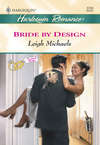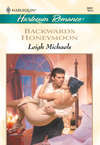Kitabı oku: «The Tycoon's Baby»
“You’d be quite willing to let me seduce you, I suppose.”
“Come on, Janey. If that kiss wasn’t an invitation—”
“I was not kissing you!” Her voice was fierce and Maddy jerked in surprise and wailed. Janey scooped the baby up into her arms, and Maddy relaxed again, her face nestled against Janey’s breast.
“I assure you,” Webb said cheerfully, “I do know a kiss when I—”
“I want you to understand I’m not interested in you personally. My only goal is the money you promised me!”
“Want to place a little bet? That it won’t be the last suggestive kiss you’ll ever give me?”
Welcome to DADDY BOOM!
Just look who’s holding the baby now! Following on from our highly popular BABY BOOM series, Harlequin Romance® is proud to bring you DADDY BOOM, full of babies, bachelors and happy-ever-afters. Meet irresistible heroes who are about to discover that there’s a first time for everything—even fatherhood!
Fifth in our series is The Tycoon’s Baby by Leigh Michaels.
Look out for Outback Wife and Mother by Barbara Hannay.

Who says bachelors and babies don’t mix?
The Tycoon’s Baby
Leigh Michaels
DADDY BOOM
Contents
CHAPTER ONE
CHAPTER TWO
CHAPTER THREE
CHAPTER FOUR
CHAPTER FIVE
CHAPTER SIX
CHAPTER SEVEN
CHAPTER EIGHT
CHAPTER NINE
CHAPTER TEN
CHAPTER ONE
THE ROOM RANG with the sound of a toddler’s giggles. Webb raised himself up on one elbow and leaned over the pajama-clad child who was sprawled on the Oriental rug in front of the fireplace. He growled gently as he threatened once more to gobble her tummy, and she shrieked with delight and yanked his hair.
Nearby, a white-uniformed woman shifted to the edge of her chair and said, “Mr. Copeland, it’s Madeline’s bedtime.”
Who cares? Webb wanted to say. I don’t, and Madeline certainly doesn’t. “I’ve only seen my little girl for twenty minutes all day, Mrs. Wilson. Can’t her bedtime be put off for a while?”
The nurse’s expression was stern. “I’d say you’ve already managed that. You’ve got her so agitated it’ll take an hour just to get her settled.”
Webb sighed and made a vow to himself that tomorrow he would get out of the office on time, no matter what. “All right.” He bent over the toddler again. “Maddy, playtime’s over. Give me a kiss before you go up to bed.”
Madeline’s enormous brown eyes—her mother’s eyes—pleaded silently, but Webb gathered her close and stood up. He rubbed his cheek against her soft dark hair and kissed her rosy cheek, then handed her over to the nurse and watched the pair of them cross the marble-tiled foyer and climb the winding stairs.
The tiny woman perched on a low rocking chair at one side of the fireplace didn’t look up from the mass of rose-colored yarn in her lap. The flicker of the flames cast long shadows, which emphasized the deep lines etched in her face. “I don’t know why you put up with that woman, Webb.”
“Because she’s the best baby nurse in Cook County.”
Camilla Copeland sniffed. “Says who?”
“She was highly recommended.”
“She’s rigid.”
“Gran, you can’t have it both ways. I’ve heard you say yourself that children need schedules.”
“I said they need security and stability. That does not mean I’m in favor of regimentation.”
Webb buttoned the collar of his pin-striped shirt and settled his tie back into place. “Gran, please don’t start this again.” But he might as well have tried to stop a battleship.
“Madeline’s only fifteen months old. Don’t you think it’s a bit early for her to be living a boarding school life-style, all bells and whistles and rules?” Camilla Copeland looked straight at her grandson and added firmly, “The child needs a mother.”
Webb dropped into a chair. He might as well make himself as comfortable as possible. They’d had this discussion a dozen times at least, and he knew better than to think he could cut it short now, because, once launched, Camilla was inexorable.
Her voice softened. “I know it affected you horribly, when Sibyl...went—”
“You have no idea, Gran.”
“But it’s been more than a year since she died, and it’s time for you to get on with your life.”
“I am getting on with my life. What I don’t plan to do is get married again—ever.”
“Oh, my dear.” Camilla’s voice was soft. “I know that you’ve been stunned—almost in a daze—ever since the accident. But you mustn’t assume that because you haven’t felt any interest in women in this past year that you never will. Those...urges...aren’t gone, Webb.”
Despite his annoyance with her, Webb had to bite back a laugh. Dear old Gran, with her Victorian way of putting things! She’d even turned just a little pink, bless her heart. Or was that simply the firelight reflecting off the half-finished sweater in her lap?
Camilla turned her knitting and started another row. “Someday, Webb, I promise you’ll be eager to have a woman in your life again.”
Webb wondered what she’d say if he pointed out that he’d only ruled out marriage, not the possibility of another woman in his life.
“And it’ll be easier for Madeline to accept a stepmother now than it will be later.” Camilla nodded firmly, as if she’d nailed her point and was assured there could be no argument.
Webb blinked in surprise. He’d thought he could practically recite this entire conversation from beginning to end with all its variations, but that last line had been a completely new twist. He felt like a skier who’d wandered off the marked trail and found himself speeding down the side of an entirely different mountain.
“Now wait a minute,” he said. “Because you’re so certain that someday I’ll decide to get married again, you think I should leap into it right now—whether I’m ready or not—because Maddy’s the right age to bond with a stepmother?”
“I didn’t say you should leap,” Camilla said. “I said you shouldn’t write off the possibility.”
Webb shook his head. “No, you weren’t nearly that flexible, Gran. So let’s assume I take your advice and get married, against my better judgment, purely so Maddy can have a stepmother—”
“I never indicated that you should consider only what’s best for Madeline. I expect you’d have a few criteria of your own.”
“That’s very generous of you,” Webb said with mock humility. “I’m grateful to have a say in this.”
“Don’t be impudent, Webb.” Camilla pushed her knitting needles deep into the mass of pink yarn. “There’s the bell, and we won’t be able to finish this discussion over dinner.”
Because the butler would hear, Webb thought. Thank heaven for small blessings.
“But I want your promise that you’ll think it over.”
Webb offered his arm. “I assure you, Gran,” he said gravely, “that I’ll give the idea all the consideration it deserves.”
Camilla’s eyes narrowed, but she didn’t leap on the irony in his voice. “And we’ll talk about this again.”
That, Webb thought, is precisely what I’m afraid of.
* * *
AS THE CLOCK neared three, the mood of the students in the lecture hall shifted from attentive to restless. Papers shuffled, notebooks closed, books scraped as they were loaded into backpacks. Finally, in the middle of a sentence, the professor seemed to notice the time. “Test next Monday,” he reminded, “after the Thanksgiving break.” The rush to the door began.
Janey Griffin stayed in her seat at the back corner of the room, finishing up her notes and waiting for the traffic jam to clear. In a couple of minutes, she’d be able to walk straight through the building without having to dodge the crowds. Besides, she needed to finish writing down the professor’s last line of logic before she left the room, because she’d never be able to reconstruct it tonight after work.
Outside the classroom, a petite blonde was waiting for her, leaning against the wall with her books folded in her arms. She fell into step beside Janey. “Do you have time for a cup of coffee?”
Janey shook her head. “I’m due at work in an hour. You can walk over to the apartment with me if you like, and talk while I change clothes. What is it, Ellen? Boyfriend problems again?”
“Dennis is being a jerk.” Ellen sounded almost absentminded. “But that’s nothing new. I can’t believe you’ve still got this job.”
“Why? I’m a good worker. In another month, I’ll be finished with my probation, and I’ll even get a raise—”
“And another noisy, greasy, disgusting machine to run.”
“Somebody has to make drive shafts, honey, or your little red car would be a paperweight instead of transportation.” Janey dodged traffic to cross the street, which separated the campus from a residential area.
Ellen broke into a run to catch up. “But why does it have to be you? If you soak your hands for a year, you’ll never get all the grease out of your skin. I can’t believe you haven’t quit by now.”
“It’s good money, and the hours are compatible with the classes I need to take. Besides, what would I do instead? Wait tables? Sorry, dear, but I’d rather smell of machine oil than french-fry grease. To say nothing of dealing with obnoxious customers...”
Which wouldn’t be any easier than dealing with the jerks on the manufacturing line, she reminded herself.
Ellen seemed to have read her mind. “Are the men still harassing you?”
“Now and then,” Janey admitted. She pulled out her keys as she ducked down the stairs beside a run-down old house to her apartment in the basement.
“What does that mean? Is it a constant hassle, or do they let you take breaks from it once in a while?” Ellen shook her head. “And you still haven’t reported them?”
“What good would it do? I’d just get myself labeled a troublemaker, which is hardly what I want before I’m even through my trial employment period. The things they do are never so clearly abusive that it’s obvious, you know, or the supervisors would have seen it already.”
“So go over their heads.”
“Oh, right. I’ll just march into Webb Copeland’s office and announce that he has a bunch of sexist redneck jerks working on the manufacturing line. And I’m sure he’ll promote me to corporate vice president and put me in charge of sensitivity training.”
She pushed the door open. The apartment looked worse than usual, with her roommate’s clothes and belongings strewn across the living-room furniture.
Ellen looked around. “Has Kasey been hosting police raids? It looks like someone’s been executing a search warrant in here.”
Janey smiled. “Actually it’s an improvement over the upholstery. Kasey has better taste in clothes than the landlord does in furniture.”
Ellen’s face was tight. “You have a horrible job, you study the most incredible hours, you live in a rat hole...”
“Ellen, please—”
“I just hate it that you have to work so hard for this!” Tears gleamed in Ellen’s eyes, and her fists clenched.
Janey said lightly, “Oh, it’s good for my soul to work hard. Besides, it’s what I get for not starting college on time. Since I had a job those few years in between and I actually made a little money, I can’t get any real financial help now.” She unearthed a box of tissues buried under a pile of Kasey’s sweaters and handed it to Ellen.
Absently Ellen pulled a tissue from the box. “Maybe my father could loan you some money.”
“Don’t you dare ask him,” Janey ordered. “Even if he had the spare cash, it wouldn’t be fair to put him on the spot. Anyway, I won’t ask anybody to loan me money unless I can come up with something to offer as security—and that’s about as likely as being struck by lightning. Look, Ellen, I know you only bring it up because you care. But being reminded of my circumstances doesn’t change them, it just encourages me to feel sorry for myself.”
Ellen sniffed and blew her nose. “I have never known you to feel sorry for yourself.”
Janey smiled. “I’m glad to find out it doesn’t show.” She went into her tiny bedroom to change into the faded jeans and shabby flannel shirt she wore to work.
She wiped off her makeup, since in the factory’s heat it would slide off her face anyway, and pulled her hair into a tight braid, which would keep it out of reach of the machines she’d be running—and tried to put what Ellen had said out of her mind.
It wasn’t as if anyone was holding a gun to her head, forcing her to live this way, Janey reminded herself. She’d chosen to sacrifice her living standard and to work at a job she didn’t like because her long-term goals were more important.
In another couple of years, she’d be far enough along in her education to qualify for internships in her field, and she’d be able to build experience and develop contacts that would help in her eventual search for a full-time job. But most internships didn’t pay, and even if she was lucky enough to land one of the few that did, she couldn’t make enough money to support herself and finish her last year of school, too.
So in the meantime she needed to put away all the money she could—and that meant for the next two years she’d be working the swing shift at Copeland Products.
Two more years of running noisy, messy machines, carving and bending solid metal into vehicle parts. Two more years of fellow employees who were unused to working side by side with women on the production line, men who vented their discomfort in crude remarks. Two more years of coming home after midnight exhausted and filthy, to be greeted by a stack of homework and an alarm clock already ticking ominously toward a too-early morning.
Two more years. It sounded like eternity.
Janey took a deep breath and forced herself to smile. She’d take it one day at a time, and she’d pull through...because she had to.
* * *
THE COPELAND PRODUCTS factory was brilliantly lit and incredibly noisy, for even during the change of shifts the machines kept running. As Janey crossed the factory floor to check in with her supervisor, her safety goggles were still dangling on their strap around her neck, but she made sure her electronic earmuffs were already in place. The earmuffs were less than comfortable, but the up-to-date engineering muted the roar of the machinery while allowing the human voice to come through loud and strong. Janey wasn’t so sure that was really a technological advance; given her choice, she’d have opted for cotton balls instead so she wouldn’t have to listen to her fellow workers. Certain ones of them, at any rate.
She arrived at her assigned post with a minute to spare, and the man who’d operated the machine on the day shift stepped aside. “It’s been running a little wild,” he said. “I’ve been adjusting it all day, but it keeps throwing the shavings instead of dropping them into the bin. I’m starting to think we’ve got a bad batch of steel and it’s not the machine at all.”
“Great,” Janey muttered, and watched intently as he showed her the adjustments he’d made. As soon as he left she pulled up a tall stool so she could perch high enough to keep an eye on every moving part. If she was going to have to baby-sit the machine, she might as well be comfortable.
The man at the next machine called, “Wish I could sit down on the job.”
She looked over in surprise. The man who usually ran that piece of equipment—the one who so frequently entertained himself by tossing suggestive remarks at Janey—was nowhere to be seen, and this worker was obviously settling in for the shift.
The wave of relief that surged over Janey surprised her just a little. She hadn’t realized how tightly controlled she’d been until suddenly she was free of the need to guard herself at every moment.
Enjoy it while it lasts, she told herself. He’ll probably be back tomorrow.
Despite the warnings, the machine seemed to be on its best behavior through the first half of the shift. As her hands automatically moved pieces from the supply pile to the machine to the pallet full of processed metal ready to move on to the next step, Janey’s brain was reviewing that last lecture and thinking ahead to next week’s test.
It was almost time for her midshift break when the machine began to groan and rattle as the day worker had warned it might, and she slowed it to a crawl and reached for the tool kit.
She had just opened the safety guard to make the necessary adjustments when the substitute worker next to her suggested that the two of them coordinate their break time so they could spend a few minutes in the back seat of his car—and he didn’t hesitate to describe the activity he had in mind.
Janey was so taken aback that she turned to stare at him, and in the instant her attention was distracted the cutting blade caught and jerked and flung a red-hot fragment. It hit the unprotected skin on the side of her neck, and she heard the sizzle even before she felt the heat.
She dropped the safety guard shut and cupped a gloved hand over the wound, wincing as the pain surged in waves like an incoming tide.
Within a minute the supervisor was beside her. “Dammit, Griffin,” he said, “we were working our way up to a perfect injury-free month, and now you do this.”
The man at the next machine said virtuously, “It’s a good thing I asked you about your family just then, Griffin. If you hadn’t turned your head you’d have gotten that piece of steel right in the face.”
Between the pain and his bold-faced lie, Janey was too stunned even to speak.
“That’s about the way it looks to me,” the supervisor said. “What were you thinking of to open the safety guard, anyway?”
From behind Janey came another voice—rich and deep, with a note which almost sounded like kindness. “Gentlemen, let’s treat the injury before we dissect the accident.”
Slowly, as if she were a music box figurine with no say in her own movements, Janey turned to face the man who’d spoken.
She’d seen Webb Copeland before, of course; he frequently walked the production lines, though not usually at this hour of the evening. But she’d never been this close to him before.
He was taller than she’d thought. Or perhaps it was the charcoal trench coat he wore, open over a pin-striped gray suit, which emphasized both his height and the width of his shoulders.
His eyes, she noted, were the same silvery gray as the steel she handled every day, though they didn’t look as chilly. His dark brows were drawn together, giving his entire face an expression of concern that was even more appealing than his good looks.
And then Janey noticed something really odd. The smell of oil in the factory was so strong that she’d never been aware of any other scent before. But now from four feet away she could breathe the essence of Webb Copeland’s cologne. In fact, the aroma made her feel just a little dizzy...
His eyes narrowed. “You’re going to the infirmary right now to get that burn looked at. In fact, I’ll take you down.”
Janey’s feminist streak wanted to say, I’ll go to the infirmary when and if I darned well please, and I don’t need to be delivered there like a package. But common sense interceded and she obediently walked beside him across the factory floor to the door that led to the office wing.
As the roar of the factory faded, Janey realized she was still wearing her electronic earmuffs, and she snatched them off. The office wing stretched before them, its silence almost more deafening than the roar of the machines.
She broke it hesitantly. “I don’t even know where the infirmary is.”
“If that’s your way of telling me you’re not in the habit of injuring yourself on the job, don’t worry,” he said with a trace of humor. “If you were, I’d have heard about it by now.”
“That’s not... I just meant I’ve only been in the office wing once, and that was the day I was hired.”
“When was that?”
Janey said reluctantly, “Two months ago.” She wondered if he was thinking, as she was, that there was still another month to go before the company would decide if she was an employee they wanted to keep or more trouble than she was worth.
Great move, Janey, she told herself. You don’t only break the safety record, but you do it right in front of the boss. And then you point out how inexperienced you are.
A middle-aged woman in a long white lab coat stepped out of a room at the end of a hallway. “The supervisor called to tell me you were on the way,” she said. “Let me take a look.” She inspected the side of Janey’s neck and shook her head. “Second degree burn—bad enough, but it’s not large and not particularly deep. It’ll hurt like fury for a while, and you’ll probably have a very interesting scar. Come on in. Let’s get it clean so we can see about minimizing the damage.”
The toe of Janey’s steel-reinforced work shoe caught on the threshold of the treatment room, and she stumbled.
Webb Copeland caught her arm and steadied her. “Those things aren’t much like ballet slippers, are they?”
“Not unless ballet slippers weigh half a ton apiece.” She glanced around the room and decided to sit in a chair rather than climb onto the examining table. “I wouldn’t know, because I never took dance lessons.”
He said evenly, “Of course not. I beg your pardon.”
Embarrassed at her sharpness, Janey rubbed her temple. “Sorry to snap at you. Look, I didn’t intend to come off like a clinging vine just now. I don’t make a habit of tripping over thin air and expecting the nearest man to catch me. I jog. I lift weights.” At least I used to, when I had time, she thought. “I even changed the oil in my car when I had one. So if you’re harboring any doubts about whether I really can run that machine, Mr. Copeland—”
He leaned against a rank of stainless steel cabinets. “I thought you’d get to the point eventually.”
The nurse interrupted. “Hold still for a minute. This is only antibacterial soap, but it’ll sting a bit.”
And that was an understatement of the same magnitude as saying that Lake Michigan was damp, Janey thought. She tried to fight back the tears, but she wasn’t entirely successful.
Webb Copeland opened a cabinet door and peered inside. If he was displaying tact by not watching her cry, Janey thought, she appreciated the gesture.
He started pushing bottles around. “Do you still keep antacids on hand, Nadine?”
So much for tact, Janey told herself. She should have expected he’d have an agenda of his own.
The nurse nodded. “Bottom shelf, on the left.”
He found the bottle and dumped three tablets into his palm.
“Sorry to upset your stomach,” Janey muttered.
He paused with the tablets halfway to his mouth. “When it comes to giving me heartburn, you can’t begin to compete with my grandmother, Ms.... I don’t seem to remember your name.”
But of course after this you’ll never forget it, Janey thought. She wanted to kick herself for drawing his attention once more. “Griffin.” She could almost hear the click in his brain as he filed the information away.
He put the bottle back and leaned against the cabinet once more. “Now tell me what happened with that machine.”
She described as clearly as she could what had gone wrong, and by the time she was done the nurse had finished treating the burn on her neck and covered it with a bandage to keep it clean.
Webb Copeland said nothing at all, just looked thoughtful.
The nurse counted out some painkillers into an envelope and handed it to Janey, and told her to stop by the infirmary again in a day or two to have the wound checked for infection.
Janey thanked her and gathered up her gloves and her electronic earmuffs. She had to force herself to stand up, and the thought of going back to work, of struggling once more with that machine, was hardly inviting. But she had a small burn, not a major disability—and the boss was watching.
Webb Copeland fell into step beside her in the hallway. Janey didn’t look at him. “It was nice of you to stay,” she said finally. “You didn’t have to.”
“I should thank you,” he said. “I’d exhausted all my excuses for working late, and you provided me with a new one.”
Janey frowned. Why should he need excuses for working late? In fact, why didn’t he want to go home?
He followed her onto the factory floor. For a moment Janey wondered why, until she remembered that he’d been on his way out of the building when she’d been injured.
The supervisor was inspecting her machine. “That certainly took long enough,” he said tartly as she approached. “What did they do? Skin grafts?” He didn’t wait for an answer. “There doesn’t appear to be anything wrong with the machinery. So unless you can give me a reason why I shouldn’t put you on report for carelessness, Griffin—”
Janey thought about it, and shook her head. The lecher at the next machine had been the catalyst, but she had been careless, opening the guard like that and then allowing her mind to wander.
“Then get back to work,” the supervisor ordered.
Behind her, Webb Copeland cleared his throat. “There will be no report of carelessness, because that machine is to be tagged as dangerous and taken out of production till we can get a repairman in to look at it. And since she has no equipment to work with, Ms. Griffin is not going back to work tonight, she is going home. Right now.”
The supervisor’s jaw dropped. The lecher at the next work station gasped.
Janey winced. But she could hardly stand in the middle of the factory and argue about it, so she meekly got her coat and keys from her locker in the break room and followed Webb Copeland out the employees’ entrance. She stopped on the curb as the November wind cut through her coat.
“Did you say you don’t have a car?” he asked.
“The bus will be along soon. Mr. Copeland, I wish you hadn’t done that.”
“Which part? And why not?”
“All of it—because there’ll be a lot of talk.”
“About what?”
“It’s obvious you don’t hang out with the guys on the factory floor, or you’d know.” But it was cold, and her neck hurt, and he’d probably think she was conceited even to suggest that the workers were probably talking about the two of them right now. It was too late to do anything about it anyway. “Never mind,” she muttered. “By the way, I hate to sound miserly, but is my paycheck going to be docked because I’m leaving early?”
“Since it’s not your fault, no. Come on, I’ll drive you home. It’s silly to wait in the cold for a bus.” He started off without even a look to see if she was coming along.
For some reason she’d pictured him in a low-slung, two-passenger convertible—but instead his car was midsized and quietly luxurious. “Of course,” she muttered. “Grandma.”
Webb slid behind the wheel. “I beg your pardon? I didn’t quite catch that.”
Janey was too embarrassed at being caught talking to herself even to duck the question. “I was just speculating that your grandmother would find it hard to get in and out of a Corvette.”
He frowned. “You don’t know my grandmother, do you?”
“Are you kidding? Of course I don’t. What would I have in common with her?”
“An excellent question,” he murmured. “Where do you live?”
She gave him the general direction and thought fleetingly about having him drop her off on campus instead of at her door. But why should it matter if Webb Copeland thought she lived in a slum?
It didn’t, she told herself defiantly. Because he didn’t matter. Not at all.
* * *
THE ENGINE PURRED as the car drew up next to one of the most bedraggled houses Webb had ever seen. He gave the place a glance and said, “I’ll wait till you’re inside.”
Janey paused, half in and half out of the car. “Don’t bother. I walk two blocks home from the bus stop every night, later than this, all by myself.”
He waited nevertheless, watching intently till he saw a light come on in the basement apartment. Then he sat back and tapped his fingers on the leather-wrapped steering wheel, and indulged himself in a long, slow smile.
She’s perfect, he told himself. Utterly and absolutely perfect.
* * *
THE MOMENT SHE walked into the employee break room the next day, Janey knew it was going to be worse than she’d thought possible. The looks were bad enough—sly sideways glances that slithered away like snakes when she tried to face them down. But as soon as she turned her back to get her safety equipment from her locker, the whispers started.
“Bet the big boss wouldn’t have walked me to the infirmary.”
“Or held your hand while the nasty nurse hurt you.”
“Or taken you home afterward.”
There was a snort of laughter. “I wonder if it was worth his while.”
Janey had had enough. She turned to face them and said clearly, “If you mean, did Webb Copeland spend the night—no, he didn’t.”
One of the men leered. “Well, it probably wouldn’t take all night,” he said pointedly.
Janey flung her locker door shut and strode toward the factory entrance. Just outside the break room stood an elderly woman with half-glasses perched on her nose, holding a clipboard. She looked from it to Janey and asked, “Are you Ms. Griffin?”
“Unfortunately for me,” Janey snapped, “yes.”
The woman was unfazed. “Then if you’ll come with me? I’m Mr. Copeland’s private secretary, and he wishes to speak with you.”
Janey stopped in midstep. “Is that so? Well, I’ve got a few things I wouldn’t mind saying to him, too. Lead the way.”
They wended down a different hall from the one which led to the infirmary. The farther they walked, Janey noticed, the grander the surroundings became. The carpets were deeper, the walls were papered or paneled instead of merely painted, and each office they passed was larger than the last.
And each person they met seemed increasingly startled at the sight of the two of them. Janey found some grim humor in that; the contrast between her—steel-toed shoes, safety goggles, electronic earmuffs and all—and the elegantly-turned-out white-haired secretary must be a stunner.
Ücretsiz ön izlemeyi tamamladınız.










